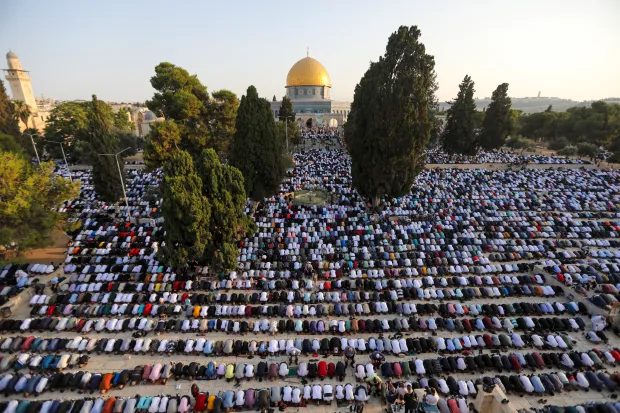Today 17 June 2024 is Eid al-Adha: A Celebration of Faith, Sacrifice, and Community
Today, millions of Muslims around the world are celebrating Eid al-Adha, one of the most significant holidays in the Islamic calendar. Known as the “Festival of Sacrifice,” Eid al-Adha commemorates the willingness of Prophet Ibrahim (Abraham) to sacrifice his son Ismail (Ishmael) as an act of obedience to God. This day is a time of deep reflection, communal prayers, festive gatherings, and acts of charity.
The Story Behind Eid al-Adha
The origins of Eid al-Adha lie in a story shared by Islamic tradition. According to the Quran, Prophet Ibrahim had a dream in which he was commanded by God to sacrifice his beloved son, Ismail. In a profound act of faith and submission, both father and son agreed to fulfill God’s command. However, at the moment of sacrifice, God intervened and provided a ram to be sacrificed in Ismail’s place. This story is a testament to the virtues of faith, obedience, and trust in divine wisdom.
Rituals and Traditions
The celebrations of Eid al-Adha begin with a special prayer called Salat al-Eid, performed in congregation at mosques or open prayer grounds. The prayer is followed by a sermon that emphasizes the significance of the holiday, the importance of sacrifice, and the need to help the less fortunate.
One of the central rituals of Eid al-Adha is the Qurbani, or the sacrificial slaughter of an animal, usually a goat, sheep, cow, or camel. This act commemorates the sacrifice made by Ibrahim and serves as a reminder of the willingness to give up something valuable in submission to God’s will. The meat from the sacrifice is distributed into three parts: one third for the family, one third for relatives and friends, and one third for the needy and poor. This practice embodies the principles of charity and community spirit.
Community and Family Gatherings
Eid al-Adha is also a time for families and communities to come together. After the prayers and the Qurbani, families gather for festive meals, sharing the meat from the sacrifice along with a variety of traditional dishes. It is a day filled with joy, gratitude, and the strengthening of family bonds.
Children often receive gifts and new clothes, adding to the festive atmosphere. Visiting friends and family, exchanging greetings of “Eid Mubarak,” and extending hospitality are integral parts of the celebrations. These gatherings not only strengthen social ties but also reinforce the values of generosity and compassion.
Acts of Charity
Charity is a cornerstone of Eid al-Adha. In addition to the distribution of sacrificial meat, many Muslims make monetary donations to various charitable organizations and initiatives. This spirit of giving ensures that even the less fortunate can partake in the celebrations, embodying the essence of brotherhood and mutual support that Islam advocates.
Global Celebrations
Eid al-Adha is celebrated by Muslims across the globe, from the bustling cities of Indonesia and Pakistan to the serene villages in Africa and the Middle East. Despite cultural differences, the essence of the holiday remains the same, reflecting the unity of the Muslim Ummah (community) in their faith and practices.
In countries with significant Muslim populations, Eid al-Adha is a public holiday, with schools, businesses, and government offices closed to allow families to celebrate. In non-Muslim-majority countries, Muslims often take time off work and school to observe the holiday, gathering in local mosques and community centers to perform prayers and celebrations.
Conclusion
Eid al-Adha is a profound reminder of the values of faith, sacrifice, and community. It is a day that not only commemorates a significant religious event but also reinforces the importance of charity, compassion, and togetherness. As Muslims around the world celebrate this holy day, they carry forward the legacy of Prophet Ibrahim’s unwavering faith and the timeless message of selflessness and devotion. Eid Mubarak to all who are celebrating!
